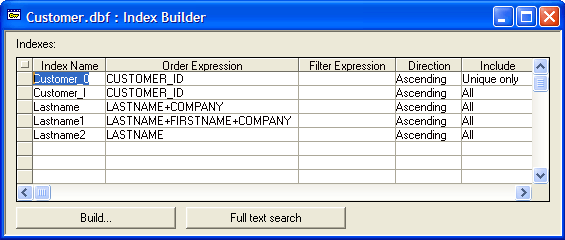

- #Create a unique index postico generator
- #Create a unique index postico driver
- #Create a unique index postico code

#Create a unique index postico generator
pg_flame - Flamegraph generator for Postgres EXPLAIN ANALYZE output.PostgreSQL for Beginners book - Intended for those who only start getting acquainted with the world of PostgreSQL.Postgres Is Underrated-It Handles More than You Think (2019) ( Lobsters).PostgreSQL: When it’s not your job (2017).

PLV8 - V8 Engine Javascript Procedural Language add-on for PostgreSQL.
#Create a unique index postico code
The Art of PostgreSQL - Book that teaches SQL to developers: Learn to replace thousands of lines of code with simple queries.pgfutter - Import CSV and JSON into PostgreSQL the easy way.Fastest Way to Load Data Into PostgreSQL Using Python (2019).postgres-operator - Controller that runs within a Kubernetes cluster that provides a means to deploy and manage PostgreSQL clusters.
#Create a unique index postico driver
pgx - PostgreSQL driver and toolkit for Go.- Simple script to analyse your PostgreSQL database configuration, and give tuning advice.PGHoard - PostgreSQL backup and restore service.WAL-G - Archival restoration tool for Postgres.PostGraphile - Execute one command (or mount one Node.js middleware) and get an instant high-performance GraphQL API for your PostgreSQL database.prettier-plugin-pg - Work-in-progress plugin for prettier to support formatting of PostgreSQL-flavour SQL.Postico - Modern PostgreSQL Client for the Mac.Slonik - PostgreSQL client with strict types, detail logging and assertions for node.js ( slonik-tools).The Internals of PostgreSQL ( HN) ( HN).pgsync - Sync Postgres data between databases.PipelineDB - High-performance time-series aggregation for PostgreSQL.Skor - Listen to Postgres events and forward them as JSON payloads to a webhook.moving conditions as deep into the query as possible, and getting rid of a join by turning it into a condition. Standard Postgres approach: run the query with EXPLAIN ANALYZE, then reduce places where unnecessary work is being done.You will rarely if ever encounter a problem someone hasn't already solved. The other main benefit of PostgreSQL is just the sheer body of resources available, with the exception of the other main RDBMS (MySQL/MSSQL) it just completely dwarfs what is available for other data stores. Schemas and by extension database integrity make it easier to move faster because migrations allow you to ensure there are no edge conditions related to stored data when upgrading your code to use an extended or otherwise modified data model. You might feel like schema-less lets you "move faster" but it's a load of horseshit that really starts to stink much sooner than you might think. Non-realtime it's very easy to handle nested JSON in PostgreSQL but I would still avoid it like the plague unless it's user-supplied data without any real schema. There are tradeoffs to both if tbh if you are asking this question you probably don't want to go that path. If you do need real time you can build it on PostgreSQL yourself depending on your requirements either using LISTEN/NOTIFY or logical replication. Unless you need real time PostgreSQL is always the most obvious solution.Can use ::1 in Postico to remove unsafe connection warning.Also trying out pgx as a Go lib to query Postgres. Want to try build something on top of pgproto3. Looking into EdgeDB now as it builds on top of Postgres and has many nice features.


 0 kommentar(er)
0 kommentar(er)
